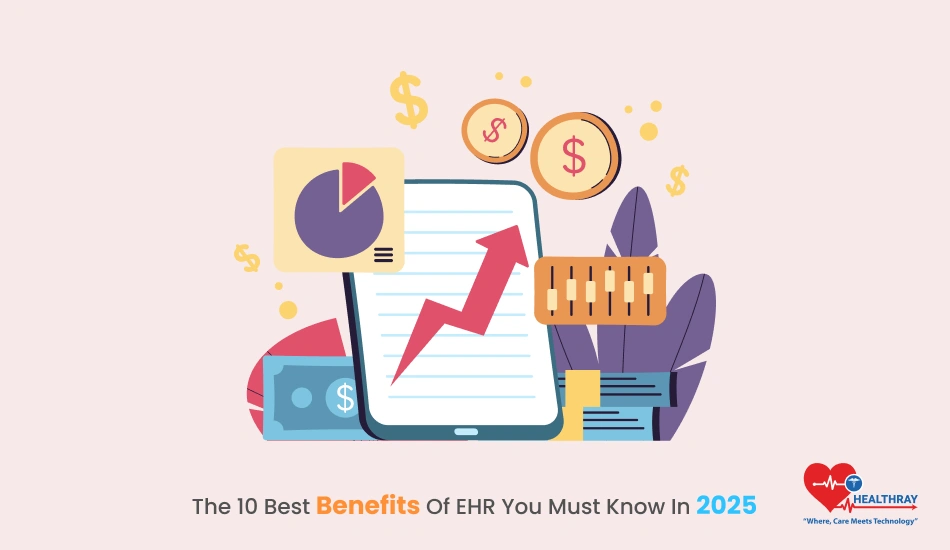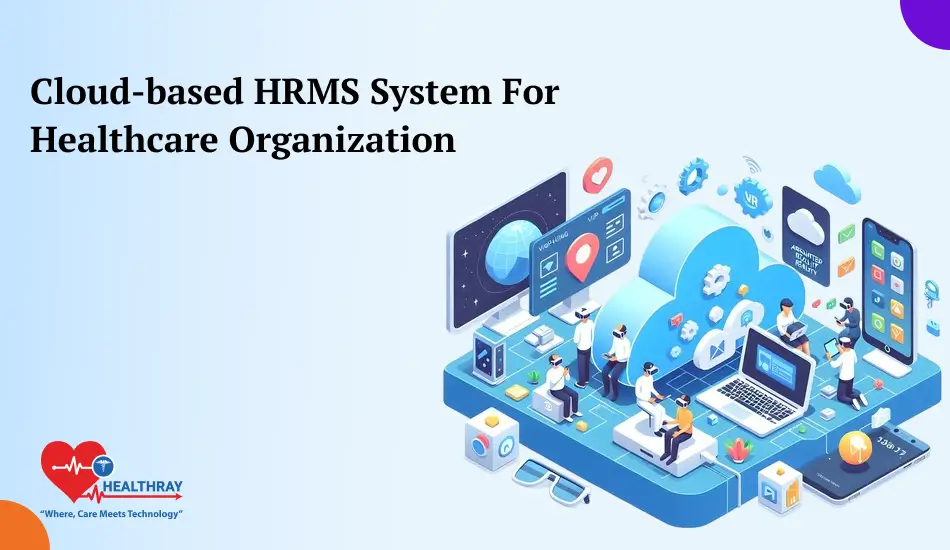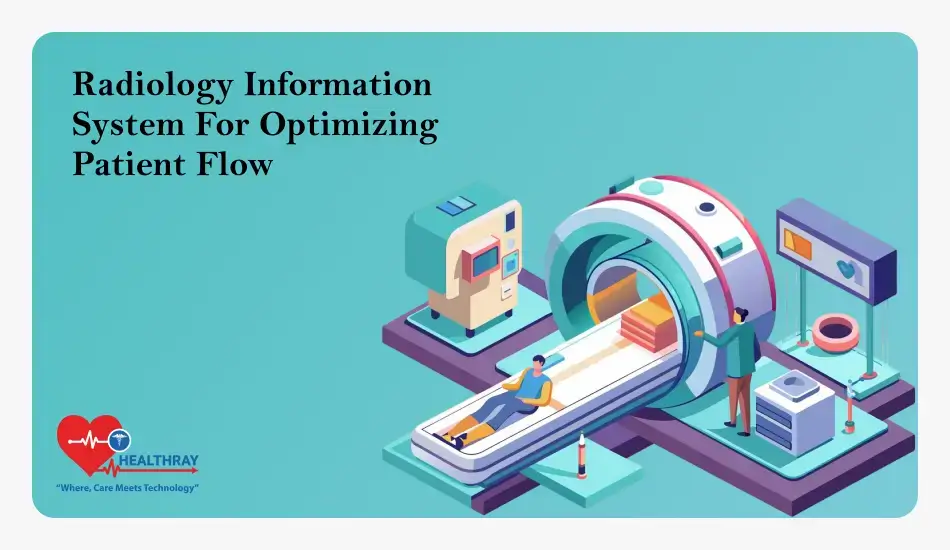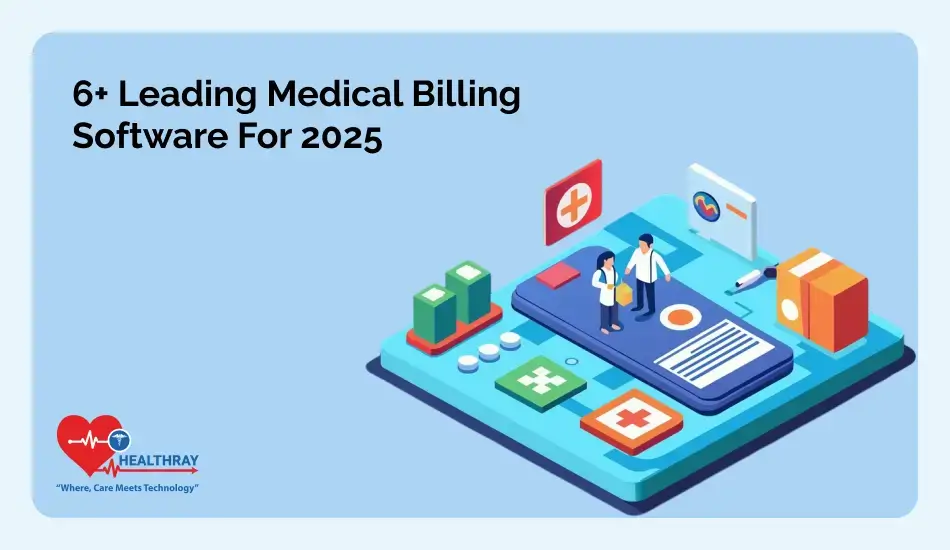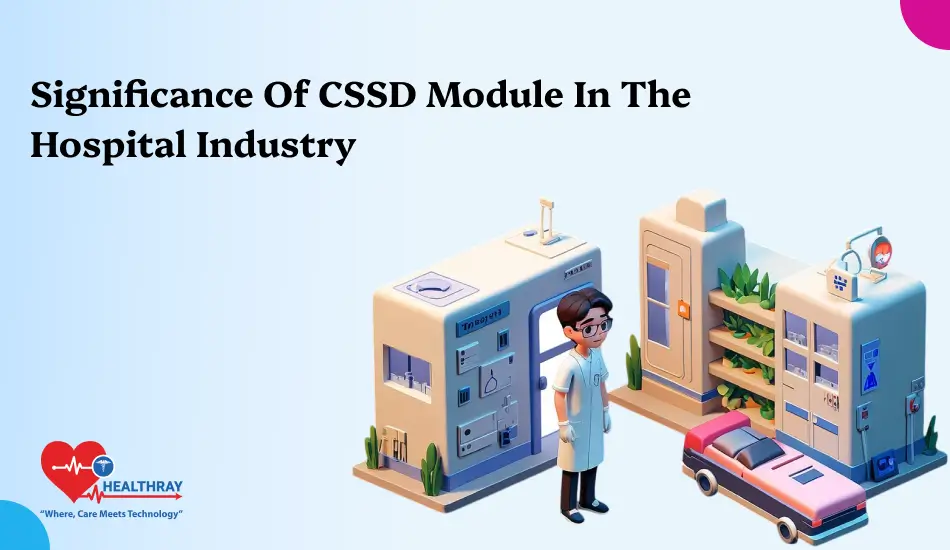Quick Summary
Discover the top 10 benefits of EHR in 2024 in this text. Some of these are lower administrative costs, better decision-making, patient engagement, administrative compliance, scalability for future development, improved information security, improved patient outcomes and care, and more.
Introduction
Hospital visits are a tough call for patients and doctors or specialists. It is because they will have to know and keep recording every minute detail of a patient. These details can include everything from diagnosis details to medication and treatment. Hence, recently, when you visited a healthcare professional, you might have seen that they keep a note or electronic medical record in their systems.
Administer clinical resources whether it is human, assets, and finance. Storing information with a click, managing the stock level, increasing financial performance, and managing the activities of clinical assets. Moreover, it increases data accessibility, improves labs results, increases clinical efficiency, and improves productivity rate.
They maintain these records in an automatic system, which is an Electronic Medical Records (EMR/EHR) Solution. It is a computer-based patient record, an electronic health record adoption, and a form of medical record for keeping patients’ medical history. It encompasses all data electronic records, such as
- progress records
- demographics
- past medical history
- list of medications
There has been a massive rise in the adoption of EHR Software in recent years for economic and clinical health, leading to better patient care. It came into existence in the 1960s, but since then, they have become an integral part of the healthcare industry. Want to know why EHR systems adoption has become so important? In this text, we will explore ten benefits of EHR systems. Let’s begin.
Importance of Electronic Health Records
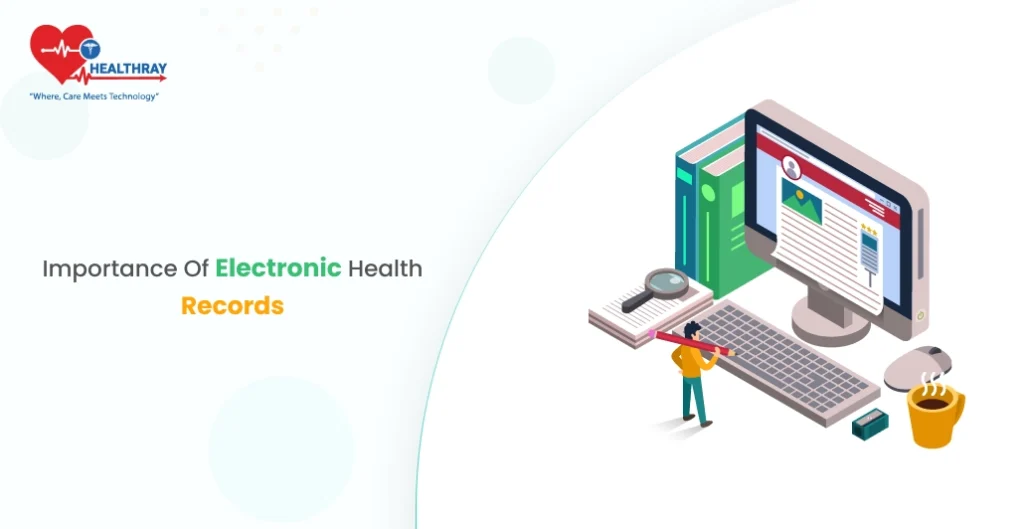
Electronic health records, or EHRs, are digital documents responsible for maintaining patients’ health records. It has accurate information regarding the medical treatment of patients. It, along with other electronic health record systems and information technology, can help a healthcare professional have a 360 view of patient health. Hence, EHRs are one of the most crucial parts of the healthcare system. It is due to the following reasons:
- Medical records store medications, medical history, treatment options, allergies, insurance details, hospital records, and much more in digital form.
- They help healthcare experts streamline operations and automate these tasks.
- EHRs aid medical experts in making clinical health decisions carefully as per data.
EHR benefits make it more important not only for healthcare experts but also for patients and clinical outcomes themselves. Patient records are now digitized, making EHRs an integral component of the healthcare sector. Its increasing demand results from patients’ demand to view health records through their handheld devices in an accessible and timely manner.
Customers consult with healthcare practitioners at any time. Check their medical reports from anywhere. Moreover, the electronic medical records system creates different medical documents with a single medical system, streamlines to find any healthcare document, create strategies to improve financial performance, eases to perform insurance procedure, and smoothly implement healthcare practices.
After COVID-19 hit the world, people preferred having digital copies of their health in electronic medical records, which makes understanding aftercare easier. Indeed, the importance of electronic health records has increased manifold over the years.
10 benefits of using EHR software
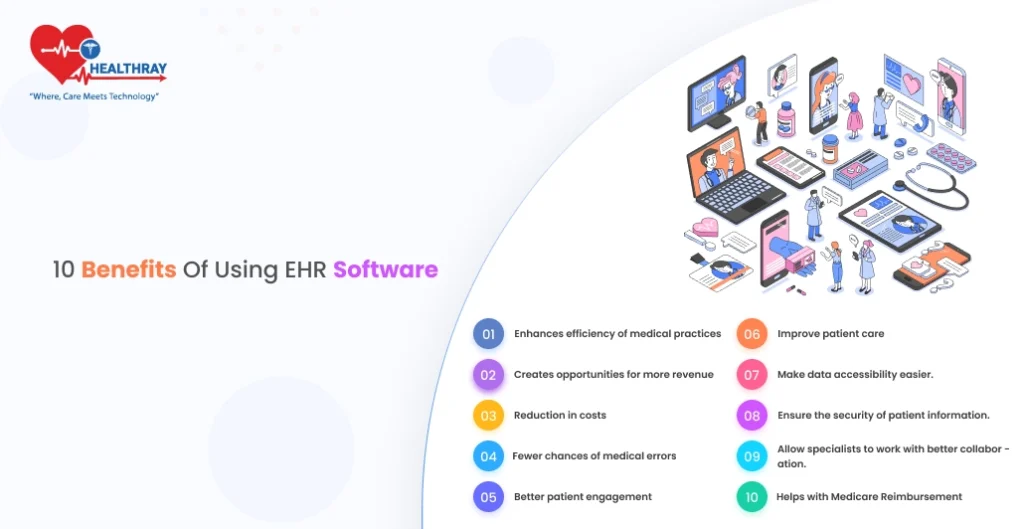
Enhances efficiency of medical practices
It is indeed said that you will not be able to understand how much precious time you waste on manual tasks until you no longer have to do them. Hence, a crucial benefit of EHR systems is that they avoid data entry manually. Now, you don’t have to contact another provider and manually enter their data into the chart.
Also, pulling patient data and sending it to the provider from another practice is unnecessary. All the patient data being shared is accessible to multiple providers, eliminating the need to conduct repetitive tasks. Certain providers have reported that they can complete charts and compile patients’ medical data even before they have left the building. Additionally, the electronic health records system delivers high-quality care, improves engagement rate, aids to medication tracking, and elevates clinical performance.
Hence, your practice can do more than expected tasks in a single day. Practices that have started using EHR from Healthray have reported that they could:
- Concentrate better on patient care.
- See more patients each day.
- Avoid burdensome paperwork
Creates opportunities for more revenue
As mentioned above, using EHR can help you check more patients daily. But this is not all. It is not the only benefit that EHR offers your practice.
- The data from the EHR system will help you identify potential prospects for clinical trials. Hence, it can help you offer your patients new forms of treatment while even generating a revenue stream for your organization.
- Automated billing systems can help cut down on claim denials and delays in reimbursement and enhance cash flow.
- Having innovative scheduling features can help you spend less time and avoid wasting it. It can help you eliminate chances of double appointment booking, fill vacant slots at first in case of cancellations or rescheduling, and lessen chances of no-show.
- Nobody wants to work for more time. Hence, a practice using modern technology is worth it. Thus, it can attract more buyers in the future.
Reduction in costs
Providers who have yet to start using EHR software generally say costs concern their organization. However, the cost of EHR software, its installation, training, and more are very tiring tasks to think about.
However, looking at the bigger picture, an EHR system can help save money for your organization. Know that it’s just comparing the upfront costs in context to the cost savings and long-term ROI.
- As more work is done in the day, it reduces the need for overtime for workers.
- Seeking a comprehensive solution that can eliminate the need for more third-party solutions
- It can also help lessen medical errors, avoid liabilities, and prevent risk.
Fewer chances of medical errors
You may know that EHRs are more than static patient charts that must be more comprehensive. EHRs use advanced technology, such as artificial intelligence, which can significantly help eliminate medical errors.
For example, when you enter laboratory data for the treatment of a specific person, AI will automatically remind you of allergies and drug interactions. It could also help a professional understand the patient’s safety interactions with over-the-counter supplements.
These systems might be helpful to the providers to see medication errors and alert the patients who might be at risk of overdose or addictions. The majority of medical medication errors are due to uninformed medical experts. Hence, using an EHR will help you have a comprehensive view of the health of patients. It can include each detail, such as previously failed treatment, and even details of laboratory tests that they thought might not be necessary.
Hence, this data can help avoid medical errors and look for better patient outcomes.
Better patient engagement
The speciality healthcare industry has now turned into one that focuses on customer demands. These days, people have a significant amount of options. Hence, being a great doctor will only sometimes be enough. These days, patients are eager to contribute to their healthcare process passively.
Hence, EHR Systems In Healthcare can be beneficial in expanding the level and quality of healthcare delivery and patient access and engagement. An excellent patient portal embedded in EHR can help them coordinate with the experts anytime they want. It could let them ask questions and raise necessary concerns.
It can also develop a repository with all the details regarding pre-treatment and post-treatment care. Patients may need the notes or paper you gave them. While this system can make the clinical data accessible at the fingertips, it can also reduce confusion and enhance compliance.
Step towards digital era with our healthcare solution
Revamp your hospital facilities and embrace change for better healthcare management. Ease in managing and organizing large medical datasets leads to effective analysis. Seize the opportunity now!
Improve patient care
More than half of the patients reported that when their doctors used EHR software, the overall quality of health care was improved. There has been a tremendous economic and clinical health and technological leap due to the global pandemic. It has eventually resulted in high-quality, personalized, norm-based health care everywhere.
For everyone these days, it is inconvenient to wait longer for the turn of their treatment. It seems intolerable for them to waste their time. Hence, an EHR system can benefit people with busy schedules and on-demand lifestyles. These integrated tools can perform the following:
- Scheduling
- rescheduling
- asking questions
Hence, patients don’t need to call before visiting. Additionally, it offers advantages when paying for health care services yourself. An integrated payment system can help in processing payments faster while seeking the service.
Although your patients will only eventually understand that your practice has become more efficient, they will surely appreciate a faster and better workflow. They will have to spend less waiting time and make the best use of their time.
Make data accessibility easier.
An EHR can be helpful to the provider in innumerable ways, but the most prominent one is allowing them access to patient records from anywhere. It can be problematic when experts need help accessing accurate healthcare information. But now, with EHR, you can easily access patient data from anywhere in the nation.
Also, with specific EHR systems, the whole health system and care providers can see each patient’s details at a glance without spending much time. It stops at individual patient records and helps with public health opportunities, research, and reporting.
This data can help you with more significant benefits and alert you to better opportunities in the market. It can also help them know about advancements in specific procedures of treatments. EHR data can be a powerful tool in making strategic decisions to safeguard your bottom line and avoid recessions.
Ensure the security of patient information.
Health and financial information are the two most crucial data equally important to patients and professionals. And know that your organization holds both types of data. And paper-based electronic records are not a safe and appropriate way to store data.
Anyone can access electronic medical records from the cabinet or copy of a patient’s paper chart files and lock them up again for a wiser move. Hence, an advantage of EHR systems is that you can lock up records selectively. You can set up a system so that a person on the billing counter can only access insurance and billing information. On the other hand, clinical staff can only view details of electronic health records.
Digital systems can help you know who viewed your records and whether they have made any changes. Hence, when you go digital, you must choose one that the provider could be HIPAA-compliant and cloud-based with multiple layers of security.
Allow specialists to work with better collaboration.
You and your patient are the minimum number of members of your patient’s care group. Other medical experts, such as dermatologists, dentists, pharmacists, and ophthalmologists, are also giving care.
The patient will get superior care, and the more efficiently these expert care providers can communicate with one another. The initial goal of the government’s EHR mandate was to empower supplier information exchange. It can empower each specialist to connect and ensure that treatment is in alignment.
Helps with Medicare Reimbursement
In the modern era of exceptional adoption of electronic health records and health information technology, EHR can be the saviour for your organization. Electronic health records software are now thought to be a new norm in the healthcare system. Meaningful use of electronic and health information technology and record adoption of this technology can help you avoid penalties in medicare reimbursements.
Using EHRS can help in exchanging information carefully and implementing a better quality of care at each point of the patient visit. Also, as per laws, using a certified EHR adoption can assist in having more excellent payment adjustments on Medicare Part B reimbursements.
EHR can provide consultations on treatment choices rather than just focusing on treatment notes from different healthcare providers. Mind you, electronic referrals are faster and easier. Communication with labs and pharmacies gets more straightforward and quicker without confusion.
Need an EHR for your organization? Know how Healthray can help!
Are you searching for an electronic health records solution for your healthcare research or organization? Healthray is here to offer you a comprehensive electronic medical record solution. Our software can help you in
- efficient documentation process
- manage patient records in the billing process
- better accuracy and efficiency
Our software has an interface that is friendly for users and has seamless integration capabilities into workflows. Our EHR can minimize disruptions and double up productivity. Seek the benefits of EHR with our customization, such as appointment scheduling, managing medication, and even secure access to data storage.
Seek peace of mind with Healthray’s EHR, which has robust security measures that can safeguard sensitive health data. Trust our EHR solution so your organization can deliver exceptional healthcare services.
Conclusion
EHR systems are specifically designed to improve patient care and enhance the efficiency of medical care settings. The majority of healthcare experts these days believe that EHR systems are beneficial solutions for overall cost savings, quality improvement, and patient safety and care. Hence, it is necessary to understand that your organizations now need EHRs in their systems.
Electronic health records (EHRs) have a few benefits for medical practices, such as financial incentives such as expanded patient care and income. But it’s vital to recognize any potential disadvantages. Decide the unique demands of your practice to make the best choice. When choosing an EHR system, prioritize reliable providers with experience, customization choices, regulatory compliance, pricing, and client feedback.
